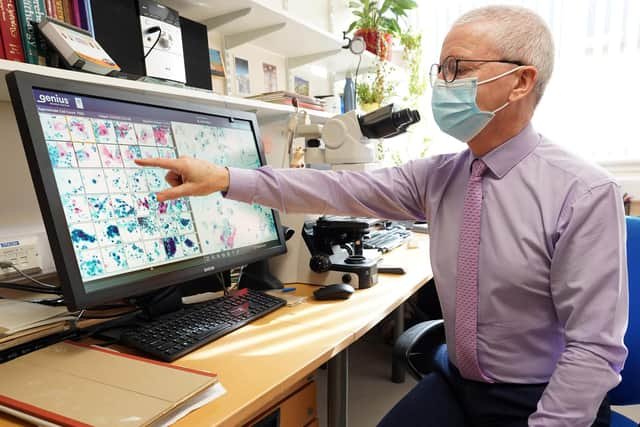Cervical cancer: Scottish hospital is first in UK to pilot artificial intelligence in screening programme
University Hospital Monklands has increased capacity by around 25 per cent and improved analysis turn-around times with the measure, which experts said could “revolutionise” the screening process.
The system, from medical technology company Hologic, creates digital images of cervical smear slides from samples that have tested positive for Human Papilloma Virus (HPV).
Advertisement
Hide AdAdvertisement
Hide AdThese are then reviewed using an advanced algorithm, which quickly assesses the cells in the sample and highlights the most relevant to medical experts, saving them time in identifying and analysing abnormalities.


Looking for abnormal cells is “like trying to find a needle in a haystack”, said Allan Wilson, consultant biomedical scientist at NHS Lanarkshire who is leading the pilot.
In some cases there could be 50 abnormal cells to be found among 15,000 normal cells, he said.
“Preliminary results from the pilot are promising, as the team at University Hospital Monklands has increased capacity by around 25 per cent in the slide assessment and improved analysis turn-around times, as well as allowing screeners to dedicate more time to training on the latest technologies and dealing with difficult-to-diagnose cases,” he said.


"We are now undertaking a retrospective study, using the digital cytology system to test its performance against previous known results. This will then provide the clinical data to make a recommendation on the use of digital cytology in the cervical screening programme in Scotland.
"Through AI and digital diagnostics, we have the potential to improve outcomes for women not only in Scotland, but around the world.”
Samantha Dixon, chief executive of Jo’s Cervical Cancer Trust, welcomed the pilot.
“Catching cervical cell changes means they can be treated to prevent them from developing into cervical cancer,” she said.
Advertisement
Hide AdAdvertisement
Hide Ad"The earlier they are diagnosed, the less invasive treatment might be. Anything that improves or speeds up this process, which in turn could improve outcomes for women and people with a cervix, is a hugely positive thing which we want to see explored fully.”
Tim Simpson, general manager of Hologic, said the company was “proud” to be working with University Hospital Monklands on the pilot.
“Digital cytology has a key role to play in ensuring pre-cancerous cells are picked up early and treated, so fewer women go on to develop cervical cancer,” he said.
"Our goal is to help create a world where no woman dies from cervical cancer.”
Cervical cancer screening is offered every five years to all Scots with a cervix aged 25 to 64.
The cervical screening test, also known as a smear test, checks the cervix for presence of the Human Papilloma Virus (HPV).
If HPV is found, these samples are sent to medical experts for review and to look for cell changes. If there are changes, the patient is invited for further specialist tests.
Some six women are diagnosed with cervical cancer every week in Scotland.
A message from the Editor:
Thank you for reading this article. We're more reliant on your support than ever as the shift in consumer habits brought about by coronavirus impacts our advertisers.
If you haven't already, please consider supporting our trusted, fact-checked journalism by taking out a digital subscription.
Comments
Want to join the conversation? Please or to comment on this article.
